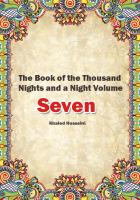For it is evident enough that words have no have now effect but on those that understand them,and then they have no other but to signify the intentions or passions of them that speak;and thereby produce hope,fear,or other passions,or conceptions in the hearer.Therefore when a rod seemeth a serpent,or the waters blood,or any other miracle seemeth done by enchantment;if it be not to the edification of God's people,not the rod,nor the water,nor any other thing is enchanted;that is to say,wrought upon by the words,but the spectator.So that all the miracle consisteth in this,that the enchanter has deceived a man;which is no miracle,but a very easy matter to do.
For such is the ignorance and aptitude to error generally of all men,but especially of them that have not much knowledge of natural causes,and of the nature and interests of men,as by innumerable and easy tricks to be abused.What opinion of miraculous power,before it was known there was a science of the course of the stars,might a man have gained that should have told the people,this hour,or day,the sun should be darkened?A juggler,by the handling of his goblets and other trinkets,if it were not now ordinarily practised,would be thought to do his wonders by the power at least of the Devil.
A man that hath practised to speak by drawing in of his breath (which kind of men in ancient time were called ventriloqui)and so make the weakness of his voice seem to proceed,not from the weak impulsion of the organs of speech,but from distance of place,is able to make very many men believe it is a voice from heaven,whatsoever he please to tell them.And for a crafty man that hath enquired into the secrets and familiar confessions that one man ordinarily maketh to another of his actions and adventures past,to tell them him again is no hard matter;and yet there be many that by such means as that obtain the reputation of being conjurers.But it is too long a business to reckon up the several sorts of those men which the Greeks called thaumaturgi,that is to say,workers of things wonderful;and yet these do all they do by their own single dexterity.
But if we look upon the impostures wrought by confederacy,there is nothing how impossible soever to be done that is impossible to be believed.For two men conspiring,one to seem lame,the other to cure him with a charm,will deceive many:but many conspiring,one to seem lame,another so to cure him,and all the rest to bear witness,will deceive many more.
In this aptitude of mankind to give too hasty belief to pretended miracles,there can there can be no better nor I think any other caution than that which God hath prescribed,first by Moses (as I have said before in the precedent chapter),in the beginning of the thirteenth and end of the eighteenth of Deuteronomy;that we take not any for prophets that teach any other religion than that which God's lieutenant,which at that time was Moses,hath established;nor any,though he teach the same religion,whose prediction we do not see come to pass.Moses therefore in his time,and Aaron and his successors in their times,and the sovereign governor of God's people next under God Himself,that is to say,the head of the Church in all times,are to be consulted what doctrine he hath established before we give credit to a pretended miracle or prophet.
And when that is done,the thing they pretend to be a miracle,we must both see it done and use all means possible to consider whether it be really done;and not only so,but whether it be such as no man can do the like by his natural power,but that it requires the immediate hand of God.And in this also we must have recourse to God's lieutenant,to whom in all doubtful cases we have submitted our private judgements.For example,if a man pretend that after certain words spoken over a piece of bread,that presently God hath made it not bread,but a god,or a man,or both,and nevertheless it looketh still as like bread as ever it did,there is no reason for any man to think it really done,nor consequently to fear him till he enquire of God by his vicar or lieutenant whether it be done or not.
If he say not,then followeth that which Moses,saith "he hath spoken it presumptuously;thou shalt not fear him."If he say it is done,then he is not to contradict it.So also if we see not,but only hear tell of a miracle,we are to consult the lawful Church;that is to say,the lawful head thereof,how far we are to give credit to the relators of it.And this is chiefly the case of men that in these days live under Christian sovereigns.For in these times I do not know one man that ever saw any such wondrous work,done by the charm or at the word or prayer of a man,that a man endued but with a mediocrity of reason would think supernatural:and the question is no more whether what we see done be a miracle;whether the miracle we hear,or read of,were a real work,and not the act of a tongue or pen;but in plain terms,whether the report be true,or a lie.In which question we are not every one to make our own private reason or conscience,but the public reason,that is the reason of God's supreme lieutenant,judge;and indeed we have made him judge already,if we have given him a sovereign power to do all that is necessary for our peace and defence.A private man has always the liberty,because thought is free,to believe or not believe in his heart those acts that have been given out for miracles,according as he shall see what benefit can accrue,by men's belief,to those that pretend or countenance them,and thereby conjecture whether they be miracles or lies.But when it comes to confession of that faith,the private reason must submit to the public;that is to say,to God's lieutenant.But who is this lieutenant of God,and head of the Church,shall be considered in its proper place hereafter.















